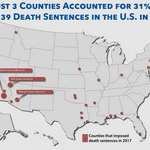
Nearly one-third (31%) of the 39 new death sentences imposed in the United States in 2017 came from just three counties, Riverside, California; Clark, Nevada; and Maricopa, Arizona, according to statistics compiled for DPIC’s annual year end report. In a press release accompanying the annual report, DPIC said that the year’s sentences reflect “the increasing geographic isolation and arbitrary nature of the death penalty.” Riverside imposed five death sentences in 2017, Clark four, and Maricopa three, and no other county imposed as many as two. The other 3,140 counties and parishes in the country imposed 27 new death sentences, fewer than the record low total of death sentences imposed in the country last year. These three counties were featured in a 2016 report by Harvard University’s Fair Punishment Project of the most prolific death sentencing counties in the country. That report found that the death penalty high-use counties tended to share “a history of overzealous prosecutions, inadequate defense lawyering, and a pattern of racial bias and exclusion,” among other criminal justice issues. In a recent article about DPIC’s year end report published in the Desert Sun, Dunham said, “You don’t see counties that overproduce death penalties and are model citizens in the administration of justice as a whole.” Current Riverside County District Attorney Mike Hestrin told the paper that he “strenuously” objected to that characterization, which he called “a bunch of nonsense.” Riverside County Public Defender Steven Harmon said that while the county has historically overused the death penalty, Hestrin, who took office in 2015, “has taken a far more measured approach to deciding in which cases he should seek the death penalty.” The Desert Sun reported in 2016 “an astronomical rise in wiretaps” in Riverside county that was “so vast it once accounted for nearly a fifth of all U.S. wiretaps,” including triple the number issued by any other state or federal jurisdiction in 2014. Riverside police ranked 9th in the nation in killings of civilians. 76% of those sentenced to death in Riverside between 2010 and 2015 were defendants of color, and during that time frame it imposed death sentences at a rate that was 9 times greater per homicide than the rest of the state. All six defendants sentenced to death in Riverside in 2016 or 2017 were black or Latino. Riverside has imposed more death sentences than any other county in the country over the last five years, and 2017 was the second time in the last three years that it sentenced more people to death than any other county. Its five death sentences constituted 45% of the death sentences imposed in California this year, and more than were imposed by any other state. Four other southern California counties (Los Angeles, Kern, Orange, and San Bernardino) are also among the ten most prolific death sentencers in the past five years, and the region has been dubbed “the buckle of a new death belt.” Riverside County alone has imposed 8.5% of all new death sentences in the country since 2013, and the five-county “death belt” has imposed 21.8%. By contrast, Harris County, Texas, which has executed more people than any other county, produced no executions or death sentences this year. Only 15% of all counties in the U.S. have ever imposed a death sentence that resulted in an execution. (Click image to enlarge.)
(“The Death Penalty in 2017: Year End Report,” DPIC, December 14, 2017; Press Release, “U.S. Sees Second Fewest Death Sentences and Executions in 25 Years,” DPIC, December 14, 2017; C. Kennedy, “Riverside County leads U.S. in death penalty sentences, but hasn’t executed anyone in 39 years,” Desert Sun, December 14, 2017). See other DPIC Reports.
Arbitrariness
Jan 03, 2024




